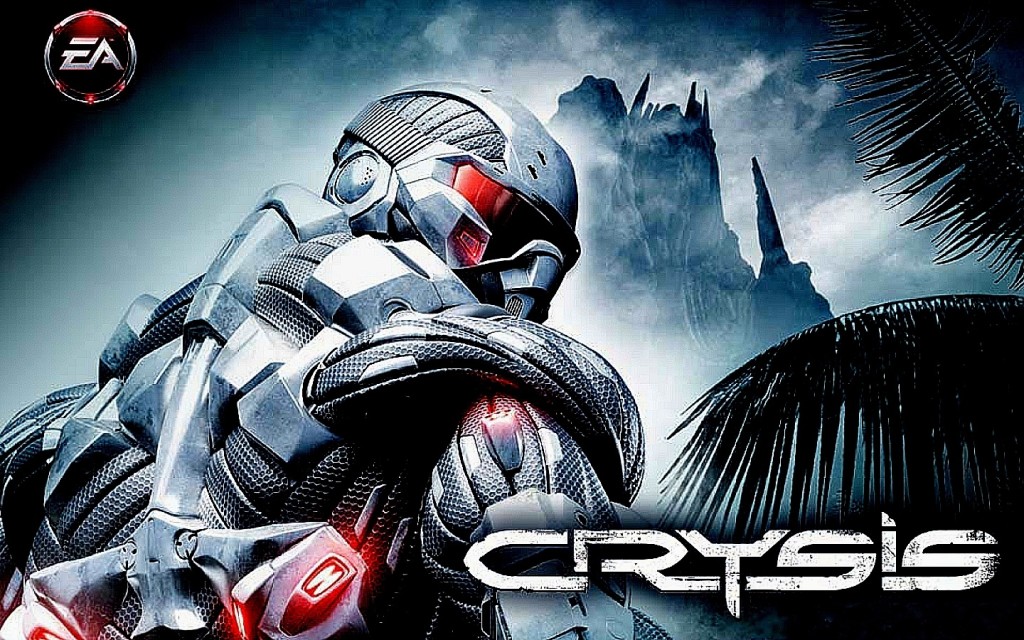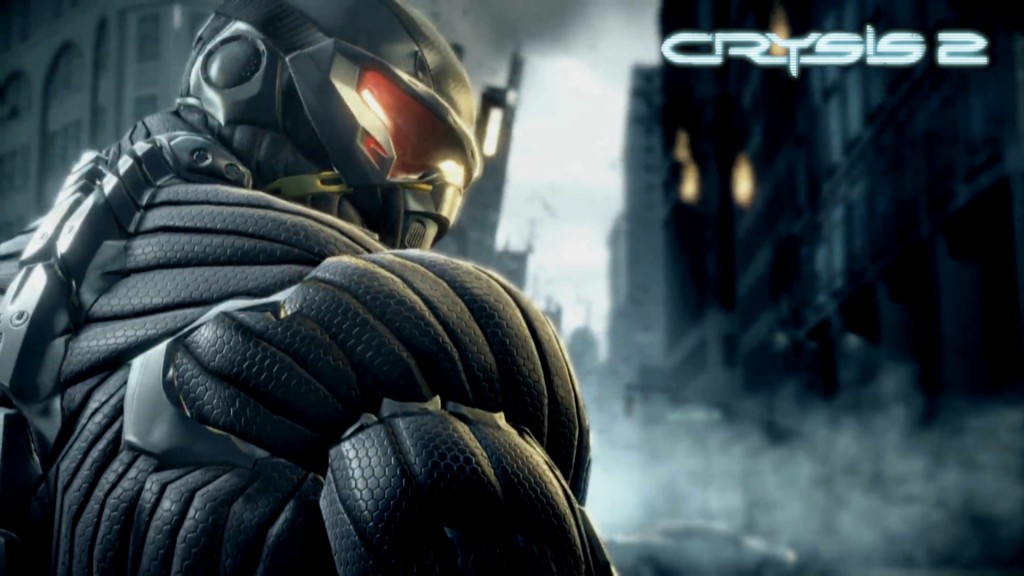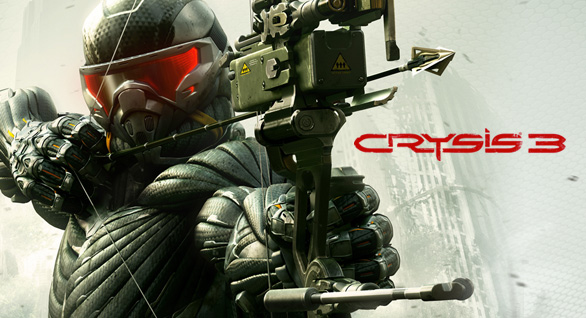
Crysis 3 comes upon us; why not talk about the original, hm?
Everyone PC gamer on earth looked to Crysis as the start of a new revolution in both gaming technology and mechanics. Revel at the realism of these graphics – your computer cannot handle this monstrosity! I even purchased a new computer to play it, so that should tell you enough (if not of my dedication, than certainly of my inability to fix things inside PC towers). Look at all the FREEDOM the game gives you! It’s linear to a point, yes, but the player gets to pick and choose their conflict. Think of Half-Life 2 four years prior and you could see a huge difference. Perhaps the story would not touch people at the same level; after all, Crytek’s previous effort (Far Cry) had great graphics and open-world style shooting, but not a great tale.
Suit power like stealth, super strength and super speed gave a player huge variety in their tactics. Similar to Vanquish’s AR Suit mechanics only two years later (one wonders whether Shinji Mikami played Crysis), Crysis gave the player a vast number of tools against overwhelming human and alien odds (not so much a spoiler). Run into a group, pick up a guy, throw him hundreds of feet away, pull out a modified assault rifle and head-shot another, speed away and then pass right into stealth. A player who mastered these tools could look like something of a super hero, darting in and out of combat like Muhammad Ali on a good night. Lush vegetation and wonderful terrain did not exist purely for aesthetic pleasure; you could use them to hide yourself, frighten enemies from the shadows, distract them with thrown objects, and all manner of different scare tactics. As the Arkham Batman games allowed you to toy with your enemies, so did Crysis allow you to mess around with North Korean soliders. The alien turn at the end forced a change in tactics – not a bad one, but much needed variety in a game that masked its relative linearity with free tactical engagement. That’s not to say enemies were unbelievably intelligent. They are just tough to kill, yet their superhuman (especially on higher difficulty) level of aim and durability meant your Nanosuit remained as necessary as ever. I seriously challenge you to try the game on the highest difficulty for just a bit and see how hard it gets. You earn every inch, and it’s quite a rush to succeed in a strategy devised on the fly.
However, its sequel would prove less interesting and more straightforward than its predecessors. Perhaps EA sensed a shift in the landscape as Call of Duty 4’s arrival heralded a new era in the first person shooter. Maybe Crysis’ transition to consoles ultimately determined the game’s design (let’s say that playing the first Crysis with a gamepad remains less than ideal). In any case, any person analyzing the game sees a subtle shift in Crytek’s design sensibilities.

Crysis 2 threw the player into New York, jumping from the natural jungle to the urban jungle. New plot elements are introduced, although the game wholly abandons them at a whim. All that context exists to give the player cool things to shoot (in this case, mercs and aliens). The enemy design, then, seems much the same as the first games; the environment changes aesthetically, but not in practice. Still, there’s a lack of life; I can’t so much mess with vehicles and destroying every building in site with nothing but my fists. The game, like a great many modern first person shooter campaigns, sets your train on the rails and never lets you off; the city environment straitjackets your sense of freedom and exploration. Coming from the first game, you would not be alone in seeing this as a disappointment.
While certain games thrive off that sense of total linearity, the core concepts of Crysis’ game mechanics center upon a freedom of use. The tools exist to empower the player in making their own strategies with the tools provided. The variety on hand seems just right and does not over-complicate the (at heart) simple joy of shooting things. Crysis 2 simplifies the system into stealth and speed, leaving out the dedicated strength mode entirely. Talk about leaving out player empowerment! Everything seems more “gamey” and less “fun” than in the original Crysis. Even the two powers still on hand seem reduced in power, specified to the New York City landscape (oh, I guess I’m not supposed to jump there). Give me an invisible wall; at least that’s less contrived. The Nanosuit development options, furthermore, do not make up for the things you had by default.
In that sense, the crisis of Crysis 3 lies in balancing two impulses. The first game made you a god with unbelievable powers who could simply destroy everything with enough good strategy; that open world illusion made Crysis rather engaging. Crysis 2, on the other hand, makes for more exciting setpieces but removes that illusion of freedom with its harsh industrialized metropolis tone and its removal of “game breaking” abilities. Crysis 3 looks like a surface-level mixture of both games, attempting a fusion of both styles. You get New York, but Jungle New York! You get turtles, but you can’t throw them as lethal projectiles! You get a bow and arrow for some reason (stealth, probably), but more contextual events.

They want you to take this seriously, yet the series’ tone and freedom inevtiably will conflict. Choose one or the other. Preferably, players want more freedom in contrast to every other overly linear FPS experience released in the past half decade. Why Crysis wishes to transform into a CoD clone remains beyond my comprehension. All a Christian can think about in this sense is the Church of Laodicea in Revelation 3:
14 “To the angel of the church in Laodicea write: The Amen, the faithful and true Witness, the Beginning of the creation of God, says this: 15 ‘I know your deeds, that you are neither cold nor hot; I wish that you were cold or hot. 16 So because you are lukewarm, and neither hot nor cold, I will spit you out of My mouth. 17 Because you say, ‘I am rich, and have become wealthy, and have need of nothing,’ and you do not know that you are wretched and miserable and poor and blind and naked, 18 I advise you to buy from Me gold refined by fire so that you may become rich, and white garments so that you may clothe yourself, and that the shame of your nakedness will not be revealed; and eye salve to anoint your eyes so that you may see. 19 Those whom I love, I reprove and discipline; therefore be zealous and repent. 20 Behold, I stand at the door and knock; if anyone hears My voice and opens the door, I will come in to him and will dine with him, and he with Me. 21 He who overcomes, I will grant to him to sit down with Me on My throne, as I also overcame and sat down with My Father on His throne. 22 He who has an ear, let him hear what the Spirit says to the churches.’
When it comes to video games, those that do too much tend to not do anything at all. Crysis, which began as something unique and incomparable, quickly turned into a derivative game style. Rather than establish its own corner, Crytek remains content to eke out a little extra profit at the expense of the game itself. Who could blame them when all that money’s at stake? It is the same in life as in the video game culture: don’t get distracted by what doesn’t matter. Seek the uniqueness that really matters, rather than lusting after temporary comforts and temporary rewards. Those like everyone else pass away, but those who change history stand forever – which would you rather?
